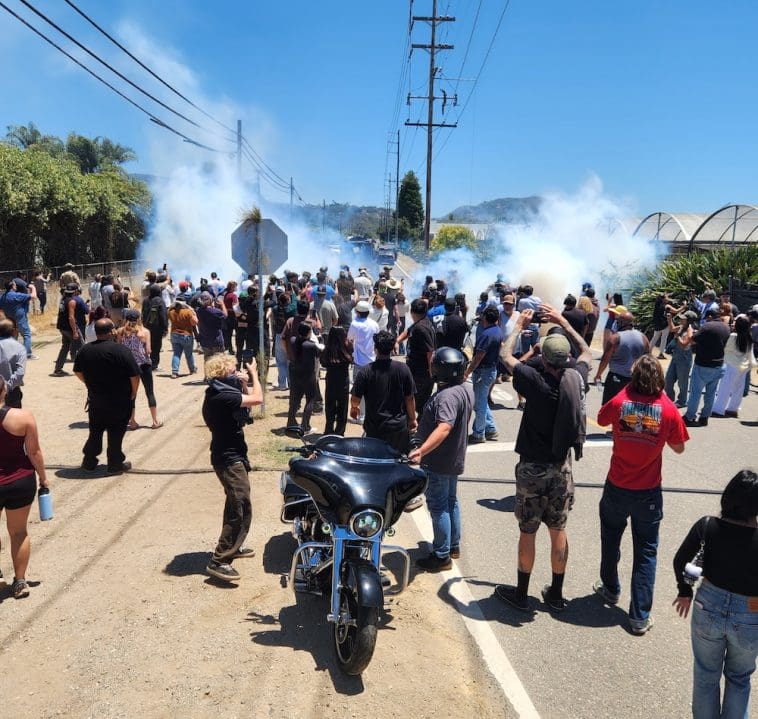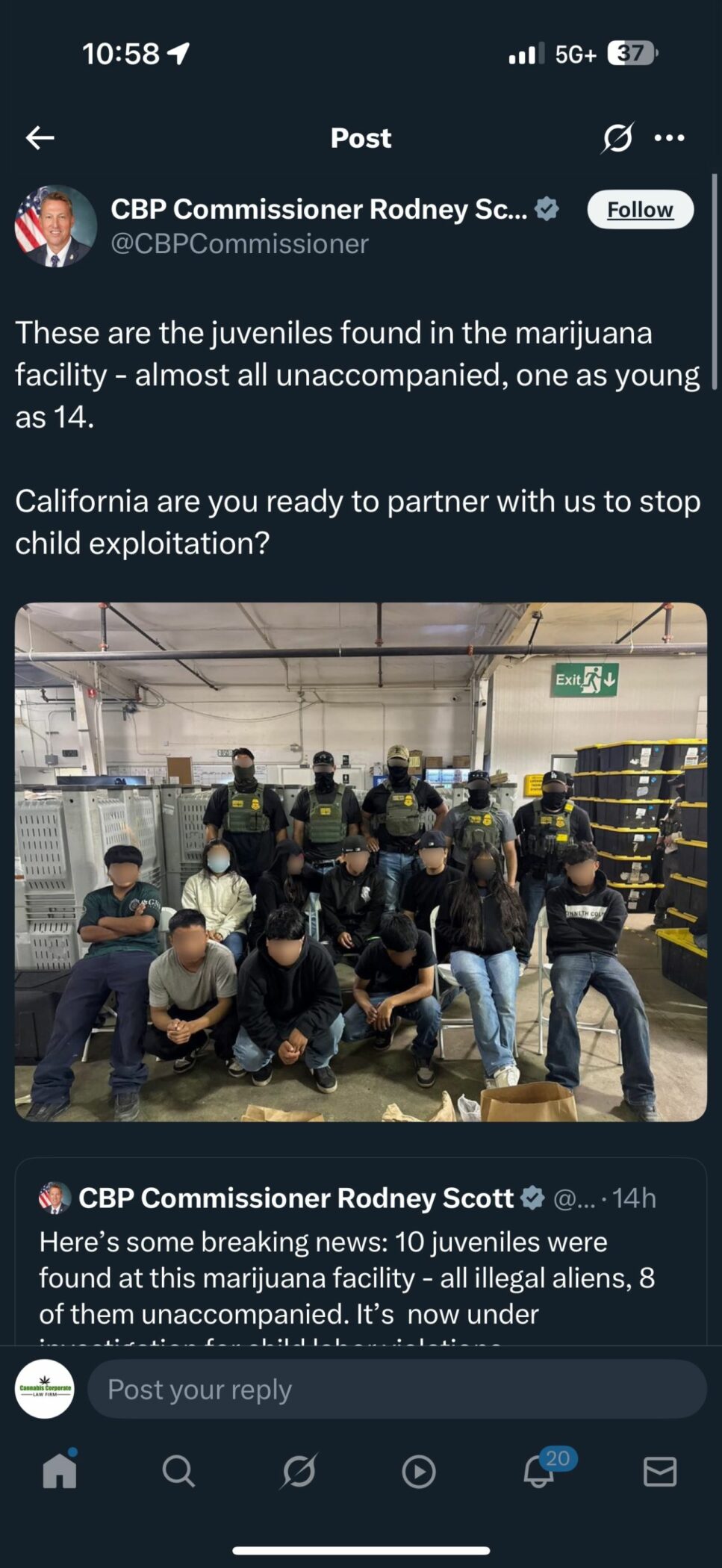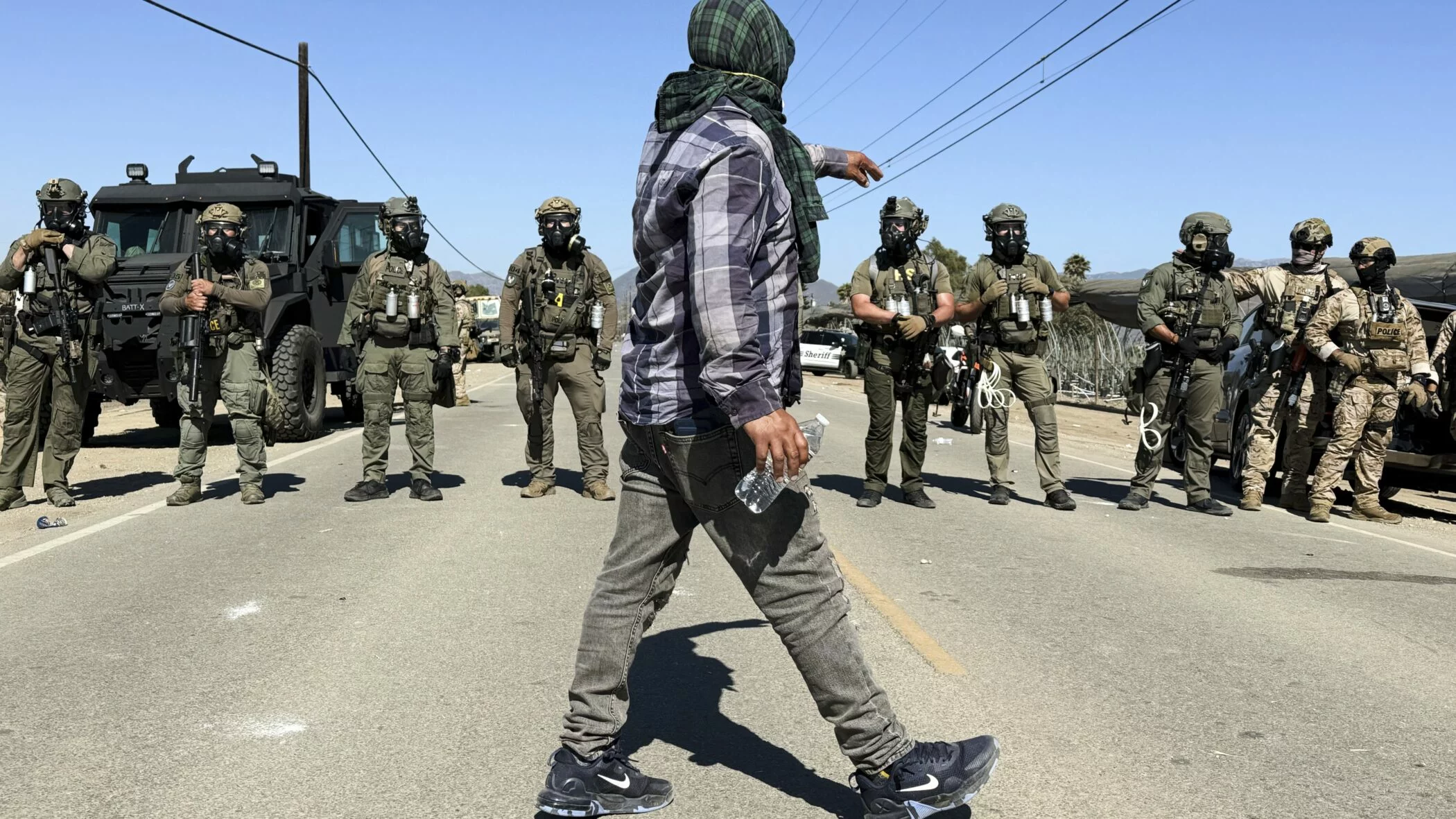ICE Raids California Cannabis Farms as Budget Swells and Allegations Mount
CARPINTERIA, Calif. — In a sweeping operation that has stirred legal, political, and cultural tensions across California, federal immigration authorities executed high-profile raids on two cannabis farms operated by Glass House Brands, one of the state’s largest and most visible cannabis companies. The action, carried out on Thursday morning by agents with U.S. Immigration and Customs Enforcement (ICE) and Customs and Border Protection (CBP), led to the detention of dozens of workers and triggered a heated response from local officials, protestors, and labor advocates.

(Police deploy tear gas at ICE riot at GHB facility California on 10th July)
The raids come amid renewed national focus on immigration enforcement and labor violations, particularly within agriculture and cannabis — sectors heavily reliant on undocumented labor and vulnerable to federal scrutiny. Authorities allege that the company may have employed individuals without proper documentation, including at least ten minors at one site in Ventura County, according to CBP. These claims remain under investigation.
Spokespersons for Glass House Brands said the company is fully cooperating with federal authorities and denies any intentional wrongdoing. “We are working to ensure our operations remain fully compliant with state and federal laws,” the company said in a statement. “We take all allegations seriously and are conducting an internal review.”

(Image: Kyle Kazan CEO of GHB from Glass House Brands)
Federal Clout, State Industry
The enforcement action unfolded at two sites: one in Carpinteria, Santa Barbara County, and another in rural Camarillo. Protesters gathered quickly, resulting in confrontations with federal agents. Authorities deployed non-lethal force to disperse crowds, including smoke grenades and rubber bullets. Three people were hospitalized and several more treated on site, local officials confirmed.
ICE said the operation followed months of investigation and was legally authorized through criminal search warrants.
“This was not a random inspection,” said a DHS spokesperson. “It was a targeted action supported by credible evidence of labor violations, including the possible presence of underage workers.”
The raids have reignited a long-standing tension between federal and state governments over cannabis policy. California legalized cannabis in 2016, and Glass House Brands is fully licensed by the state. However, cannabis remains illegal at the federal level, and federal agencies are not bound by state regulatory frameworks.
Governor Gavin Newsom criticized the operation, calling it “militarized overreach” and accusing federal authorities of politically motivated targeting. “This is not how we should treat workers, families, or legitimate California businesses,” Newsom said in a statement. “It is especially concerning that agents used force on peaceful protestors in the name of labor enforcement.”

(Image: ICE Van blocked by protesters 10th July California)
A Budget Bigger Than FEMA
Thursday’s raids come at a time when ICE’s reach is expanding — both operationally and financially. According to the latest appropriations data, ICE was awarded more than $75 billion in discretionary funds this fiscal year, making it one of the best-funded federal law enforcement agencies. That figure now exceeds the individual budgets of FEMA, the U.S. Secret Service, and the Transportation Security Administration (TSA), suggesting a dramatic expansion of ICE’s capacity and strategic priority within the Department of Homeland Security.
Policy analysts note that the growth in funding has enabled ICE to widen its scope from high-profile deportations to broader labor enforcement efforts, particularly in industries seen as politically or culturally sensitive.
“This is not the ICE of 2015,” said Dr. Monica Estrada, an immigration policy scholar at UC Davis. “This agency now has the resources and the political backing to intervene in domestic labor markets with much greater force.”
Political Irony and Public Scrutiny
The political subtext surrounding the Glass House case has drawn equal attention. Public records and previous media coverage, including from The Los Angeles Times, show that Kyle Kazan, co-founder and CEO of Glass House Brands, has expressed support for Republican policies and previously praised aspects of former President Donald Trump’s criminal justice platform. He has also publicly aligned with law enforcement groups advocating for drug policy reform.
Kazan’s past political stances have now become a point of irony for critics, who note that his company is facing scrutiny under the same federal priorities he has supported.
A spokesperson for Kazan declined to comment directly on the political discourse but reiterated that “the company is focused on full legal compliance and the wellbeing of its employees.”
Still, the contrast between Kazan’s affiliations and the current federal action has not gone unnoticed among activists and political observers.
“It underscores a deeper truth about cannabis,” said Angela Villanueva, a labor organizer in Santa Barbara County. “You can be wealthy, white, and well-connected, and still get raided. But it’s the workers who always bear the consequences.”
Labor, Cannabis, and the Law
The presence of undocumented and underage workers in California’s legal cannabis industry is a long-standing issue, complicated by federal prohibition, patchy labor oversight, and a highly competitive market. While most major operators claim compliance with labor laws, enforcement remains uneven.
A 2023 report from the California Labor Commissioner’s Office found that nearly 28% of audited cannabis farms were in technical violation of state labor laws, including wage discrepancies and failures to document employment status.
Federal officials have not yet filed charges against Glass House Brands or its leadership. ICE and CBP have stated the investigation is ongoing, and that they are working with the Department of Labor and local law enforcement agencies to verify all findings.
“The allegations, if proven true, are deeply concerning,” said Congressman Salud Carbajal, whose district includes parts of Santa Barbara County. “But the use of excessive force and disruption of lawful operations in our state should give all of us pause.”

What Comes Next
As of Friday morning, no formal charges had been announced, and the company’s cultivation sites remained operational. Protesters have vowed to return, and civil rights groups are calling for an independent review of the enforcement tactics used during the operation.
Meanwhile, federal officials appear undeterred.
With a ballooning budget, intensified policy mandate, and a shifting political environment in Washington, ICE’s actions on Thursday may be a preview of a more aggressive enforcement future — one that does not exempt licensed cannabis operations, regardless of their political ties or legal status under state law.
“This raid was not an outlier,” said Estrada. “It was a warning shot.”
Editor’s Note: This article includes allegations that are currently under investigation. No findings of guilt have been established. Glass House Brands and its executives are presumed to be operating in compliance with all applicable laws unless determined otherwise by a court of law. Main Image: Associated Press. A demonstrator walks in front of federal agents blocking a road during an immigration raid in California.



































